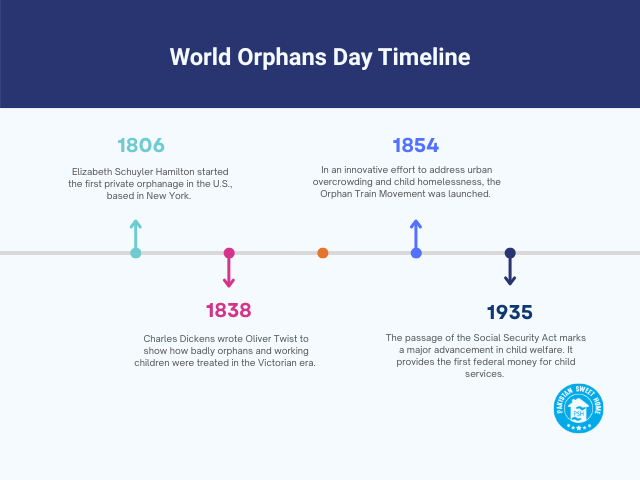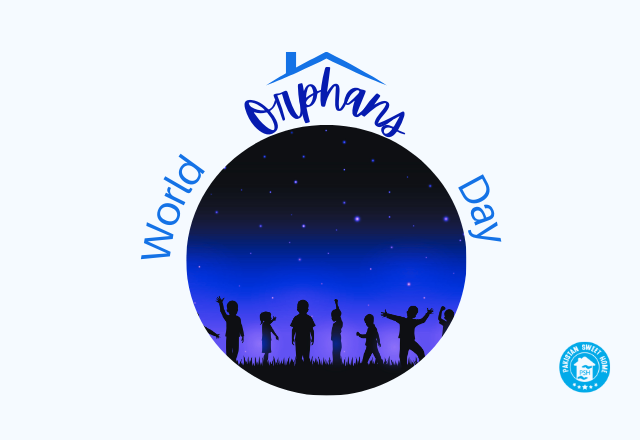Millions of children wake up every day without the comfort of a parent's love or protection.
They face hunger, loneliness, and a constant fight for survival, without guidance, support, or even basic care. These children are not just numbers—they’re dreams interrupted, futures at risk, and hearts silently breaking.
But you can be the difference that brings light back into their world.
Let’s explore the history, importance, and meaningful ways you can make a lasting impact this World Orphans Day.
History of World Orphans Day
Here is a look at how people have cared for orphans over time and how World Orphans Day started.
Early Orphan Care in Ancient Civilizations
The first recorded instance of formal orphan care comes from the Romans, who established the world’s first orphanage around 400 AD. But even centuries ago, Jewish and Athenian laws required care for orphans until age 18.
Even the renowned philosopher Plato emphasized this responsibility. He urged people to care for orphans like their own children and handle their inheritance carefully.
Philosophical Views on Orphans by Plato
Plato passionately advocated for the protection of orphaned children, stating that public guardians should oversee their welfare. He warned not to ignore their feelings and said guardians should love them like their own children.
According to him, the property of orphans should be handled with utmost responsibility, even more carefully than one's wealth.
Medieval Europe and Church-Led Orphan Care
During the Middle Ages, the responsibility of caring for orphans shifted primarily to the church. Monasteries and religious institutions became safe havens for many parentless children.
However, as time progressed into the 1900s, particularly in England, the number of orphans soared. The living conditions in orphanages deteriorated drastically, often becoming centers of abuse and neglect.
The Harsh Reality Highlighted in Literature
The grim state of orphanages during the Industrial Revolution was powerfully captured in Charles Dickens’ iconic novel, Oliver Twist. In this story, Dickens showed how orphaned children were often treated harshly, facing hunger, abuse, and forced labor instead of love and care.
5 Surprising Facts About Oliver Twist The novel was based on the true story of Robert Blincoe, a child laborer whose harsh life inspired Dickens to write Oliver Twist. Charles Dickens worked in a factory at age 12, and this experience shaped his writing and views. - A Film Adaptation in 1968
The story’s powerful message reached even wider audiences when it was turned into a well-received film in 1968. - Originally Published as a Serial
Oliver Twist was first released in parts starting in 1837. After the third installment, it was published as a complete book. - Disney’s Animated Version
In 1988, Disney turned the novel into a cartoon movie called Oliver & Company for a new generation. |
Modern Criticism of Orphanage Systems
Today, child development experts and researchers widely agree that orphanages are not ideal environments for growing children.
Studies show that children in orphanages often miss out on the love, care, and personal attention they need to grow well. This growing awareness has sparked significant debate around the need for alternative care options.
The Rise of International Adoptions and Ethical Concerns
To give vulnerable children a better life, many families, especially from Western countries, have turned to international adoption. While well-intentioned, this movement has unfortunately opened the door to unethical practices.
Some adoption agencies take advantage of poor families by buying children cheaply and selling adoptions for high fees.
The Birth of World Orphans Day
To draw attention to the global orphan crisis, World Orphans Day was established by The Stars Foundation. The day aims to raise awareness about the millions of children who grow up without the love and guidance of parents. The Foundation aims to encourage people and communities to help by donating, volunteering, or raising awareness.

Why Do Children Become Orphans?
Being an orphan doesn’t happen from just one event; it usually comes from many sad and complicated reasons.
Armed Conflicts
Wars, terrorism, and political unrest can completely destabilize communities, forcing families to flee or separating them indefinitely. Many times, parents are killed, jailed, or disappear during conflicts, leaving children with no one to care for them.
These children are left traumatized, often displaced, and extremely vulnerable to exploitation, child labor, or recruitment into militant groups.
Disease
In regions lacking adequate healthcare, treatable diseases elsewhere can become deadly. When a child loses one or both parents to illnesses like HIV/AIDS, tuberculosis, or untreated infections, they become orphans suddenly.
Without proper guardianship, these children may also suffer from poor health and be deprived of education and protection.
Extreme Poverty
When families are trapped in deep poverty, they may be unable to feed, clothe, or educate their children. Because of this, some parents have to leave their children in orphanages or with others, hoping for a better life for them.
Poverty doesn’t just create orphans through abandonment—it also prevents extended families from stepping in to help.
Natural Disasters
Events such as earthquakes, floods, hurricanes, and droughts can wipe out entire communities in minutes. Parents can perish while children survive, or families may become separated and never reunited.
After these disasters, many children find themselves in shelters or on the streets without any proof of who they are or where they come from.
Social Stigmas
In some cultures, children born outside of marriage or from forbidden relationships are often rejected by society and even their own families. These children may be abandoned at birth or shortly after, growing up without any parental support or identity.
Stigma can also prevent communities from helping these children, further isolating them from care and compassion.
Accidents
Children lost their parents in an instant due to tragic accidents such as car crashes, workplace incidents, or natural disasters. With no extended family available or willing to help, these children are left without any guardianship or direction.
Sudden orphanhood from accidents leaves children not only grieving but also unprepared for the harsh realities of survival.
Importance of World Orphans Day
The journey to break the cycle of neglect begins with awareness, but it continues with action.
Here’s how we can build a better world for orphaned children:
The Power of Family
A family provides more than just shelter—it offers love, identity, and stability. When this foundation is missing, the emotional toll on children can be devastating. That’s why promoting family-based care and adoption is critical. Every child deserves a nurturing environment to grow and feel secure.
Supporting Through Community
Support doesn’t always mean money. Volunteering your time, sharing a skill, or simply being a consistent presence in a child’s life can mean the world to them. Caring adults serve as role models, helping shape the child’s emotional and psychological well-being.
Education as Empowerment
Education is a key that can unlock a future full of possibilities. Yet many orphaned children lack access to even basic schooling. By investing in their education, we empower them to rise above poverty, develop self-confidence, and contribute meaningfully to society.
Breaking Social Stigmas
Children without parents often face discrimination rooted in cultural and societal biases. World Orphans Day reminds us to see orphans not just as people who need help, but as strong and full of hope. Acceptance and inclusion must replace judgment and pity.
Celebrating Resilience
Despite unimaginable loss, many orphaned children display incredible strength and determination. Their stories are filled with perseverance, hope, and transformation. World Orphans Day is not just about their struggles—it’s about honoring their spirit and supporting their dreams.
Fight Child Labor
In poverty-stricken regions, orphaned children often become victims of child labor. With no financial support, they are forced to work instead of study or play. Donating to their basic needs gives them a chance to enjoy a normal childhood, free from the burden of survival.
How Can You Make a Difference?
You don’t need to be a policymaker or a billionaire to help. Even small gestures, when multiplied by many, can lead to monumental change.
1. Raise Awareness
Use your voice and your platforms to highlight the challenges orphaned children face. Share stories, infographics, and statistics on social media to educate your audience. Even a single post can inspire compassion, spark important conversations, and encourage others to take action.
2. Give Essentials
Donating basic items like clothes, books, toys, and hygiene kits can make a meaningful impact on a child’s life. These small gestures bring comfort and restore dignity to those in need. Involve your children in the process to help them understand the joy of sharing and the importance of generosity.
3. Educate the Next Generation
Start meaningful conversations with your children about the realities that many orphaned kids face every day. Teach them empathy by helping them understand what it’s like to grow up without parental care. Nurturing compassion early on can build a generation that values kindness and social responsibility.
4. Host a Charity Drive
You don’t need a big stage to help others—begin by organizing a small charity event at your school, college, or neighborhood.
Collect funds, clothes, toys, and books for orphaned children. If you're donating used items, make sure they are clean, presentable, and in good condition to show care and dignity for those receiving them.
5. Cook and Share a Homemade Meal
There’s something deeply fulfilling about sharing a meal you prepared with love. Cook a wholesome dish from scratch and deliver it to a nearby orphanage or group home. A warm, home-cooked meal can brighten a child’s day and make them feel cared for in the most comforting way.
6. Sponsor a Child or Support Their Daily Needs
You don’t have to adopt a child to make a difference in their life. Sponsorship allows you to cover essential needs like education, food, and clothing.
You can sponsor or donate to a registered and well-reputed orphanage in Pakistan, Pakistan Sweet Home, which is dedicated to the care and development of orphaned children. Even small acts count, like encouraging your local knitting group or senior home to make handmade blankets for children in group homes.
In conclusion, World Orphans Day serves as a vital reminder of the millions of children worldwide who have lost parental care due to various reasons such as illness, conflict, poverty, and natural disasters. Understanding the meaning of this day reminds us to show compassion and support for vulnerable children urgently.
By learning about the causes that lead to orphanhood, we become more aware of the challenges orphans face daily. Most importantly, individuals can make a difference by volunteering, donating, and advocating for child welfare. They can also help by raising awareness to ensure orphans receive the love, care, and opportunities they deserve.
Be the Family Orphans Never Had

info@pakistansweethome.org.pk
(051) 4865856
+92 335 1118477







